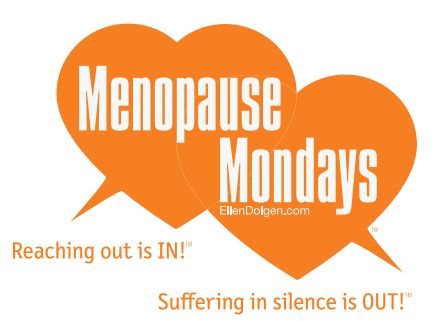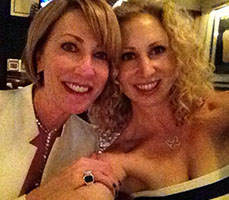
As if the highs, lows, and hair-pulling frustrations of raising a hormonal teenage girl weren't enough, more and more mothers are wading through these turbulent waters during their own hormonal journeys: perimenopause and menopause.
Back when moms started popping out kids while in their teens, moms' and daughters' hormones rarely needed to duke it out, as most children were young adults by the time their mothers had a chance to enter perimenopause. My mom was in her 40s when I was in my early teens, and I started having night sweats just as my kids exited their teenage years. These days, the average age of first-time mothers in the United States is 25.4, according to the National Center for Health Statistics. That's up 2.7 years from just 1980! This suggests that more and more, moms are entering perimenopause while their children are younger and going through their own hormonal chaos.
 My daughter, Sarah and me --
My daughter, Sarah and me --
taken at Blogher 2013
According to the Parenting Research Centre, most children enter puberty between the ages of 11 and 15 years--with some making the big change between their 8 and 9 birthdays! Typically, girls enter puberty about 18 months earlier than do their male counterparts. So let's say you had a child at 30 and she entered puberty at 12, you would be 42. This lands you smack in the average age zone of entering perimenopause.
So if you and your daughter are having at it -- and your husband and son have gone into hiding -- know you aren't alone. By realizing that you and your daughter are actually going through many of the same emotional swings can be helpful in bringing peace to your home. After all, both times are marked by huge shifts in hormonal levels (in girls, estrogen levels increase eight-fold during puberty!), mood swings, and even hot flashes, according to the Parenting Research Centre. "With the exception of infancy, the amount and speed of physical growth and change in adolescence is greater than in any other time in a person's life," states its website.
It's our responsibility to open up the channels of communication with our kids (even if they don't like to be called "kids" anymore!). So talk to them! Take my Menopause Symptoms Chart (to get it, all you need to do is to sign up for my free Menopause Mondays Newsletter in the top right column) and sit down with your daughter for an open chat about your menopausal symptoms and what she is experiencing. You two might even find out that you both are experiencing some of the same symptoms. Using books, printed materials, and even websites to guide your conversation sends the message that her experiences are normal, according to ParentingTeensNetwork. The sense that "I am normal and this is normal for a girl my age" is far too uncommon among young women -- and even grown-up ones for that matter!
Still, there's more to the challenges of these periods in women's and girl's lives than hormonal changes -- and when you're in the midst of it, it's very tough to understand it all. The upheavals that are going on in women's lives can be more extensive than those caused by hormonal changes alone. Both puberty and menopause are marked by huge life changes due to relationship conflicts, shifting places in the social strata, and morphing identities -- all of which can make women of all ages feel powerless, confused, and frustrated.
"Parents Just Don't Understand" is a theme familiar to all of us. While grown women have all once been teenagers, it is also true that when we were that age, it was a much different time. During middle and high school, we never had to deal with scathing remarks on social media or sexts from boys. Instead of telling your kids, "everything seems so big now, but when you are older it will all seem so small," try "that sounds hard. I'm sorry." Even if it will be a long-gone memory in a few years, a teen's experiences are big in the moment, and that's what matters now. Teens need their feelings and experiences to be respected and acknowledged. Teens, like all of us, need to have permission to feel their feelings -- even if we really don't understand them or they don't want to share every last one of them.
So when your pubescent daughter starts to push you away and no longer loves to share every detail of her day with you, but would rather hide out in her room, do not take it personally. Remember: It is not about you! Rather than scream and yell back, share your perimenopausal journey with her and show up with a hug instead of a tongue-lashing. (You can always head to your bedroom and scream in your pillow afterward!)
As Cindy Goodman, co-author of raisingteensblog.com writes, "I, like the mothers of teen daughters before me, need to stand on the periphery for now and understand my role, letting her set the tone for what she is willing to share. I'm here for support, giving her persistent reminders that I'm on her side and trying to strike that delicate balance between friend and mother." Before you know it, those stormy teenage years will be behind you and you will see your relationship morph into a sharing, loving, and mutually beneficial adult friendship that you will bring you great joy again!
In the end, don't we all just want to have our feelings respected? Whatever we are going through in our change-of-life moments, be it first loves, schoolyard squabbles, and more estrogen than we know what to do with -- or less-than-frequent date nights, workplace disputes, and so little estrogen our docs are writing us prescriptions for its replacement -- we just want and need for our highs and lows to be recognized as the legitimate experiences they are! It's up to us to show our daughters that they can own their experiences for now and for always!
Reaching out is IN! Suffering in silence is OUT!
For more by Ellen Dolgen, click here.
For more on women's health, click here.
Ellen Dolgen is an outspoken women's health and wellness advocate, menopause awareness expert, author, and speaker.
After struggling through the silence that surrounds menopause, Ellen resolved to help women reach out and end the confusion, embarrassment, and less-than-lovely symptoms that come with "the change." Her passion to be a "sister" to all women fueled Ellen's book, Shmirshky: the pursuit of hormone happiness. As a result of her women's wellness journey, and in response to the overwhelming thirst of her ever-expanding audience for empowering information, Ellen's weekly blog, Menopause Mondays was born.
Menopause Mondays allows Ellen an expansive platform from which she broadens her discussion of menopause, women's health, and life as a menopausal (and fabulous!) woman. Her weekly Menopause News Flash provides a one-stop shop for the latest menopause and women's health news and research, allowing women the access and know-how needed to take charge of their health and happiness. In addition to Ellen's ever-growing social media presence, EllenDolgen.com has fast become "the place" on the web for informative and entertaining women's menopause and wellness engagement. In 2012 and 2013 EllenDolgen.com was named first on the list of the "Best Menopause Blogs" by Healthline. Ellen is also a regular contributor to over a dozen leading women's health blogs. Her motto is: Reaching out is IN! Suffering in silence is OUT!
Ellen has appeared on the "TODAY Show," "NBC Nightly News", the "Rachael Ray Show," "The Doctors," Oprah Radio, Playboy Radio, NPR's "Tell Me More," Doctor Radio, and dozens of regional and national media outlets. Ellen is also one of the first regular contributors to debut on The Huffington Post's recently added site, Huff/Post50, which targets 116 million Americans over the age of 50.
Like Ellen Dolgen on Facebook, follow her on Twitter and Pinterest, connect with her on LinkedIn, Google+, and Klout, watch her videos on YouTube, and subscribe to her newsletter.
Earlier on Huff/Post50:
